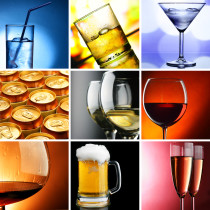Heat Stress and Alcohol; not a good combination.
- By Ross Di Corleto
- 19/01/2015
- 1 Comment
Sit in on a workplace presentation relating to managing heat stress you are likely to encounter some comment regarding the negative effects of alcohol. The irony is that how often do you sit and watch a major sporting event played in a hot climate and see members of the audience sipping on a cold beer or other alcoholic beverage. The same can often be said after a long hot day working outside. So what is the science behind this instruction; is it valid or is it just another myth generated by the faceless few? Being someone that doesn’t mind the odd ale on a hot day this became a question for me that needed answering.
As it turns out there is a solid foundation to this theory. One of the key aspects of the issue is the diuretic effect of alcohol, i.e. its ability to make you pass more fluid than you take in, when you have that beer or gin and tonic. This is something that apparently has been known about since way back in the sixteenth century as noted by the porter in Shakespeare’s Macbeth (see Dr Karl 2012). It is this effect that can increase the risk of dehydration significantly.
When dehydrated, the body produces a hormone called vasopressin or ADH (anti-diuretic hormone) whose role it is to prevent you from losing any more water and maintain your fluid level, so as they say, “ipso facto”, you pass less urine (just showing off my limited Latin vocab). The villain in this scenario, alcohol does just the opposite; its impact is to reduce the level of ADH produced, contrary to the body’s requirement. It is generally accepted that alcohol can cause you to lose an additional 50% of fluid, i.e. you drink 100mls but pass approximately 150mls. Hence, as you drink alcohol your fluid levels can actually go backwards.
As with most things to do with the body it is not the same with all individuals and there is some variation depending on the level of alcohol in the drink, as well as your level of hydration to begin with. There are numerous papers produced on this topic and there was some interesting work done on this area by some researchers in the late 90’s and again more recently (Sherriffs et al, 1997; Hobson et al 2010). Some points of note include:
- The volume of urine produced tends to increase as the quantity of alcohol increases.
- When recovering from dehydration, drinks containing 4% alcohol can delay the recovery process.
- The diuretic effect of alcohol is “blunted” or reduced when the body is dehydrated.
Don’t forget another very important dehydration route associated with alcohol. When too much alcohol is consumed there is another side effect, some people tend to vomit. This can increase dehydration dramatically as you lose fluid as a result here as well.
So what does this all boil down to? If you are going to have drinks containing alcohol, be aware that you will lose fluids faster than normal and dehydrate quicker. They are not an effective method of re-hydration (low alcohol; drinks do have some re-hydration benefit but non- alcohol is better).
Does that mean stop drinking alcoholic drinks in the heat? At the risk of being called a wowser, that is the general suggestion. However should you decide that this is a bit too dramatic a step to take another approach is;
- Make sure you are well hydrated before you head off to an event where you may have a few alcoholic drinks.
- As you drink also top up with water in between to help keep the fluid levels up.
- Before you go to bed have another glass of water (sports drinks can be good here to replace some electrolytes you have lost during the visits to the bathroom).
You will probably still end up a bit dehydrated in the morning but not as bad. You may even find the hangover a little less than usual, (I may need to do some more research on this one).
BOTTOM LINE
Alcoholic drinks are not a recommended method for rehydration; in fact they will dehydrate you faster. Stick to non-alcoholic drinks or water for that purpose. If you must drink, drink responsibly.
WANT TO KNOW MORE
A good plain language explanation at ABC Science with Dr Karl Kruszelnicki (2012): http://www.abc.net.au/science/articles/2012/02/28/3441707.htm
Shirreffs, S. M., and Maughan, R. J.,(1997) “Restoration of fluid balance after exercise-induced dehydration: effects of alcohol consumption.” J. Appl. Physiol 83: 1152 – 1158.
Hobson, R. M., and Maughan, R. J., (2010), “Hydration status and the diuretic action of a small dose of alcohol.” Alcohol and Alcoholism Vol. 45, No 4, 366 – 373.

 Copyright © 2025
Copyright © 2025
good thanks for sharing with us